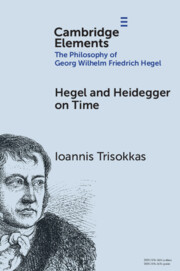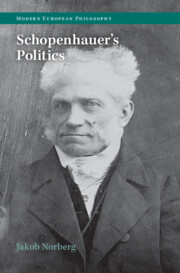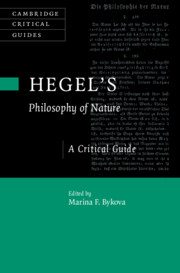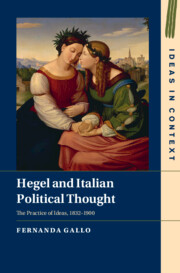148 results
34 - Corporatism
- from Part III. A - The State
-
-
- Book:
- The Cambridge Handbook of Constitutional Theory
- Published online:
- 27 March 2025
- Print publication:
- 24 April 2025, pp 585-602
-
- Chapter
- Export citation
Chapter 2 - Marx’s Critique of Hegel: Politics
-
- Book:
- Karl Marx and the Actualization of Philosophy
- Published online:
- 17 April 2025
- Print publication:
- 24 April 2025, pp 39-61
-
- Chapter
- Export citation
30 - The State
- from Part III. A - The State
-
-
- Book:
- The Cambridge Handbook of Constitutional Theory
- Published online:
- 27 March 2025
- Print publication:
- 24 April 2025, pp 523-536
-
- Chapter
- Export citation
Socioeconomic Inequalities in Hegelian Market Society and Hegel’s Theory of Justice
-
- Journal:
- Journal of the American Philosophical Association , First View
- Published online by Cambridge University Press:
- 10 March 2025, pp. 1-19
-
- Article
-
- You have access
- Open access
- HTML
- Export citation

Hegel and Heidegger on Time
-
- Published online:
- 20 February 2025
- Print publication:
- 06 March 2025
-
- Element
- Export citation
Chapter 5 - Schopenhauer’s Polemics
-
- Book:
- Schopenhauer's Politics
- Published online:
- 09 January 2025
- Print publication:
- 23 January 2025, pp 159-201
-
- Chapter
-
- You have access
- Open access
- HTML
- Export citation
Chapter 1 - The Independently Wealthy Gentleman
-
- Book:
- Schopenhauer's Politics
- Published online:
- 09 January 2025
- Print publication:
- 23 January 2025, pp 23-70
-
- Chapter
-
- You have access
- Open access
- HTML
- Export citation

Schopenhauer's Politics
-
- Published online:
- 09 January 2025
- Print publication:
- 23 January 2025
-
- Book
-
- You have access
- Open access
- Export citation

Hegel's Philosophy of Nature
- A Critical Guide
-
- Published online:
- 19 December 2024
- Print publication:
- 12 December 2024
Introduction
-
- Book:
- Ethnos of the Earth
- Published online:
- 12 December 2024
- Print publication:
- 19 December 2024, pp 1-28
-
- Chapter
- Export citation
Chapter 3 - Coriolanus and the Work of Spirit
-
- Book:
- Shakespeare's Political Spirit
- Published online:
- 12 December 2024
- Print publication:
- 19 December 2024, pp 112-150
-
- Chapter
- Export citation
Chapter 10 - Hegel’s Theory of Animal Embodiment
- from Part III - Organics
-
-
- Book:
- Hegel's <i>Philosophy of Nature</i>
- Published online:
- 19 December 2024
- Print publication:
- 12 December 2024, pp 199-216
-
- Chapter
- Export citation
Chapter 4 - On Hegel’s Account of Nature and Its Philosophical Investigation
- from Part I - Hegel’s Philosophy of Nature in the Historical and Systematic Context
-
-
- Book:
- Hegel's <i>Philosophy of Nature</i>
- Published online:
- 19 December 2024
- Print publication:
- 12 December 2024, pp 76-96
-
- Chapter
- Export citation
Chapter 1 - The Feebleness of the Concept in Nature
- from Part I - Hegel’s Philosophy of Nature in the Historical and Systematic Context
-
-
- Book:
- Hegel's <i>Philosophy of Nature</i>
- Published online:
- 19 December 2024
- Print publication:
- 12 December 2024, pp 15-35
-
- Chapter
- Export citation
Chapter 6 - Hegel’s Dissertation on the Orbits of the Planets
- from Part II - Cosmology, Mechanics, and Physics
-
-
- Book:
- Hegel's <i>Philosophy of Nature</i>
- Published online:
- 19 December 2024
- Print publication:
- 12 December 2024, pp 119-137
-
- Chapter
- Export citation
Chapter 2 - Nature and Its Limits
- from Part I - Hegel’s Philosophy of Nature in the Historical and Systematic Context
-
-
- Book:
- Hegel's <i>Philosophy of Nature</i>
- Published online:
- 19 December 2024
- Print publication:
- 12 December 2024, pp 36-57
-
- Chapter
- Export citation
Chapter 2 - George Eliot
- from Part I - 1850–1900
-
-
- Book:
- The British Novel of Ideas
- Published online:
- 05 December 2024
- Print publication:
- 12 December 2024, pp 46-63
-
- Chapter
- Export citation
Chapter 8 - Hegel’s Mechanics as a System of Steps from Space and Time to Celestial Motion
- from Part II - Cosmology, Mechanics, and Physics
-
-
- Book:
- Hegel's <i>Philosophy of Nature</i>
- Published online:
- 19 December 2024
- Print publication:
- 12 December 2024, pp 158-175
-
- Chapter
- Export citation
Chapter 13 - The Prospects for an Idealist Natural Philosophy
- from Part IV - On Contemporary Challenges for the Philosophy of Nature
-
-
- Book:
- Hegel's <i>Philosophy of Nature</i>
- Published online:
- 19 December 2024
- Print publication:
- 12 December 2024, pp 259-272
-
- Chapter
- Export citation

Hegel and Italian Political Thought
- The Practice of Ideas, 1832–1900
-
- Published online:
- 11 December 2024
- Print publication:
- 05 December 2024


